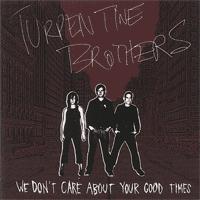There are plenty of blues songs about a person's sense of destiny. That manifests itself in some cases as a righteous bravado, at other times as a sorrowful introspection, seeking redemption. -- Yet there's no redemption for the Turpentine Brothers. Theirs feels like the soundtrack of a man clearly on the long road to hell. There's no salvation waiting, but if he can sneer and swagger the entire way down it'll be worth it.1
It seems appropriate to craft dramatic passages about this Boston three-piece. There's something about their mix of punk defiance, 60's soul and garage sleaze that's so well-suited for storytelling. Their cumulated efforts have resulted in such a sense of character, such a striking attitude, that what may very well be a side project feels like the most important band on the planet while the record's spinning.
Turpentine Brothers is the brainchild of guitarist Justin Hubbard of the Kings of Nuthin' and drummer Tara McManus of Mr. Airplane Man. While the duo started off moonlighting old country standards, their creation soon became something comparable to Reigning Sound, the Mystery Girls and the Deadly Snakes. Integral to their current sound is the swirling, wild organ work of Zack Brines (a King of Nuthin' himself). While ably filling out the band's low end with a foreboding drone he manages to contribute striking, song-stealing solos that push Turpentine Brothers to another level entirely. Those that compare him to the Doors' Ray Manzarek are certainly on the right track.2
The sound works so well because the band's drawing from a far deeper and more interesting well of history than their peers. It's easy to have a sleazy garage band that sounds like the Stooges, but less so the vintage Stax R&B sounds found here. This is most obvious in the album's three covers. The first is of "Fool For You," a Curtis Mayfield tune from his days with Chicago soul group the Impressions. Hubbard's take is spirited and lively, but there's a tortured quality to his vocals that make the chorus work in this context. Midway though the record the band delivers a cut written by Texas bluesman Charles Brown, and the distorted wall raised behind "I Wanna Be Close" would fit well on a Black Keys record. Most strikingly, the band turns Chris Clark's Motown standard "Love's Gone Bad" into a stomping, sleazy garage tune. These covers all seamlessly fit the band's lyrical themes and they rightfully filter and interpret, rather than mimic, the artists' original work.
Speaking of originals, the Brothers' own tunes are no slough. The album kicks off with the hard-hitting pair of "People Are Talkin'" and "Something's Not Right" before delving into the haunting and soulful "Why Can't I Do." The instrumental "Wrong Night" features an earthy country guitar, and perhaps some of the most vintage-sounding moments on the record. The chorus to "All The Same" is fascinating, featuring that same anti-climactic buildup that the Strokes so often lift from Television and the Velvets. "One Man" is a mournful tune, somewhat of a murder ballad, that closes off with a harshly distorted guitar solo and some well placed, gloomy trumpet. This song leads into the title track, which (quite effectively) carries the sorrowful tone on for a few seconds only to explode into a fast, upbeat punk song. It's a brilliant buildup to a fantastic tune, and "We Don't Care About Your Good Times" lets Hubbard and Brines break into a few choice solos over McManus now raging backbeat. Considering how it's sequenced on the record, it's a breathtaking track.
Turpentine Brothers have delivered a remarkable record with We Don't Care About Your Good Times, one that feels like some great unearthed gem: the bastard lovechild of 60's soul and Nuggets proto-punk. Yet for all this, there's something very real going on here, something deeply rooted but not quite revivalist. This is growth and development in a genre that so often looks back instead of ahead.
1 - I deeply and sincerely apologise for that introduction. I admit it's not very good, but I just couldn't let it go.
2 - I could care less about the Doors and the pseudo-intellectual cult of dolts that worship at the corpse of Jim Morrison, but let's face the truth: Manzarek's organ leads in "Light My Fire" from around 1:07 to, oh, 3:15 are among the cooler moments of rock'n'roll ever recorded.
